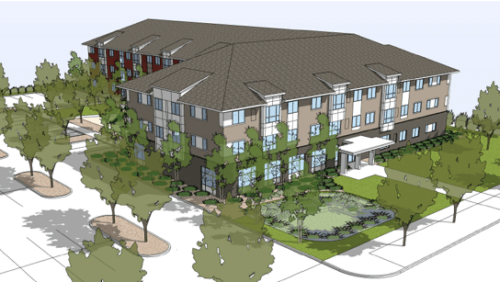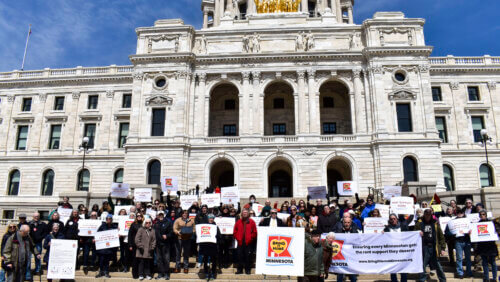How affordable supportive housing impacts residents and addresses challenges in the housing ecosystem
We all do better when we all have a home we can afford. This affirmation guides us in our work to see that all people have a home. Right now, too many hardworking Minnesotans – your neighbors, teachers, service workers, and maybe even someone in your family – are struggling to have the stability of home.
![]() The issue of homelessness and housing instability is one that impacts everyone in Minnesota. We know a key solution to combating Minnesota’s housing crisis is affordable and supportive housing.
The issue of homelessness and housing instability is one that impacts everyone in Minnesota. We know a key solution to combating Minnesota’s housing crisis is affordable and supportive housing.
At our 2024 Congregation Convening, our collaborative heard from two individuals who have firsthand knowledge of the challenges we face in our current housing ecosystem, and what role supportive housing plays in seeing that all people have a home.
Learn more as Beacon’s President and CEO Chris LaTondresse sits down for a Q&A with Beacon resident Iyanna from Nicollet Square, youth supportive housing from Beacon, and YouthLink’s Mark Miller, the Program Supervisor in at Nicollet Square:
In conversation with Mark Miller from YouthLink and Iyanna from Nicollet Square
Chris LaTondresse, Beacon Interfaith Housing Collaborative’s President and CEO: I have spoken a lot at the high level about affordable housing in the state, and specifically about what Beacon does with supportive housing. I can tell you stats all day, but the best way to really know what is at stake and what we are talking about is hearing from those living or working at one of our Beacon homes.
I am honored to invite up Mark and Iyanna to tell us about their experience at Nicollet Square. Nicollet Square serves youth who have experienced homelessness. It is fully supportive housing through our partnership with YouthLink.
Let’s start with some introductions.
Iyanna, Nicollet Square Resident: I am 23 years old, and I am from Minnesota. I’ve been living at Nicollet Square for about two years now, going on my third year.
![]() Mark Miller, YouthLink Program Supervisor at Nicollet Square: My experience with youth goes back 27-years to the first time I lived in Minnesota when I worked in arts and education. I went away to California and was there for another 12 or 13 years. That is when I began working in housing and homelessness issues. Life brought me back to Minnesota. For the last two years I’ve been the Program Supervisor for YouthLink. This means I am in charge of providing supportive services to 42 young people who live at Nicollet Square apartments.
Mark Miller, YouthLink Program Supervisor at Nicollet Square: My experience with youth goes back 27-years to the first time I lived in Minnesota when I worked in arts and education. I went away to California and was there for another 12 or 13 years. That is when I began working in housing and homelessness issues. Life brought me back to Minnesota. For the last two years I’ve been the Program Supervisor for YouthLink. This means I am in charge of providing supportive services to 42 young people who live at Nicollet Square apartments.
Chris: I’ve been sharing some background about supportive housing tonight, and I’d like to invite you to share more personally what the past couple of years have been like with all the challenges we’re up against.
The pandemic is not over for the residents we serve, or any of us. The social and economic impacts are still with us. I’d love to hear you reflect on this a little bit. Iyanna, what has it been like to be a young adult navigating all these challenges?
Iyanna: What some people may not realize about my generation is how the first couple years of our adult lives were impacted by the pandemic. For people my age who have experienced instability, we all come from different backgrounds and different family struggles that have made life especially challenging.
When I would ask people who were older than me how to do these things to get stable and how to transition into adulthood, the adults around me didn’t have the answers. It felt like I was getting passed around. It was like the first time for everybody. It was hard to feel like I was accomplishing any goals.
Some examples of roadblocks I faced were getting an ID and trying to find a stable job. When I did start to get help, so many people needed help too and the process was so much harder.
Chris: Thank you for sharing this, Iyanna. Mark, could you share more about what supportive housing means in this context, especially for young people?
![]() Mark: Everyone who has experienced homelessness has a very unique story that is a convergence of circumstance, situation, timing, and personality. When you look at these stories, reoccurring themes start to emerge. And those themes are easy to identify, like stable income. Being able to earn enough money to take care of yourself or your family is very difficult. During the pandemic jobs went away. Underneath this happening, there are community issues that rise to the top. One of those is health care, particularly mental health care and access to that care.
Mark: Everyone who has experienced homelessness has a very unique story that is a convergence of circumstance, situation, timing, and personality. When you look at these stories, reoccurring themes start to emerge. And those themes are easy to identify, like stable income. Being able to earn enough money to take care of yourself or your family is very difficult. During the pandemic jobs went away. Underneath this happening, there are community issues that rise to the top. One of those is health care, particularly mental health care and access to that care.
For people who are experiencing untreated or undiagnosed mental health issues, those start to become substance abuse and chemical dependency issues. When synthetic opioids became common street drugs, the risk to young people became deadly.
Those are some of the big issues we are constantly assessing for, engaging residents in, and trying to figure out what we can do to support people through those crises.
At Nicollet Square, we are here to do whatever it takes to move individuals forward through the challenges that are against them. We’re working to remove barriers, advocate for residents, and offer relevant resources.
![]() Chris: Thanks to both of you for setting the bigger picture on what we’re experiencing and holding together in communities. To bring it closer to home, in this case literal home, Iyanna, would you be able to share on what your experience at Nicollet Square has been like? Can you share your earliest memories of setting foot in that place, and what this home has meant for you and that journey?
Chris: Thanks to both of you for setting the bigger picture on what we’re experiencing and holding together in communities. To bring it closer to home, in this case literal home, Iyanna, would you be able to share on what your experience at Nicollet Square has been like? Can you share your earliest memories of setting foot in that place, and what this home has meant for you and that journey?
Iyanna: When I first moved in, it was New Years Eve of 2021. It was a big accomplishment for me. That whole year I was hoping to move into my own place. But I had no idea how I was going to move, or where I was going to move. It was a big blessing to move in on the last day of the year. I got to celebrate with my friends and family. I woke up in my new crib, and it was a refreshing start to the new year.
I am very used to doing things by myself, especially because I was on my own for the first few years of my adult life. So, when I moved into Nicollet Square, they had a first-time apartment kit. There were all the little essentials. They also had a big closet full of different things we could take for our apartment.
That moment helped me realize that I was in a different type of housing. I wasn’t just in a place with reduced rent. All the workers in the building told me their job descriptions and how I can utilize their services.
Mark: Our closet full of essentials come from donations by Plymouth Congregational Church. We don’t want these simple things to be obstacles that slow us down. If a resident needs a warm coat, there is no reason why they shouldn’t get one. So those donations are just one way we help remove barriers for residents.
![]() Iyanna: Another service I’ve found useful is YouthLink’s career program called Workfast. I did a few internships through them. I did one for Minneapolis Parks and Rec, and Butter Bakery where I work now. I am hoping to start another internship so I can balance two of them.
Iyanna: Another service I’ve found useful is YouthLink’s career program called Workfast. I did a few internships through them. I did one for Minneapolis Parks and Rec, and Butter Bakery where I work now. I am hoping to start another internship so I can balance two of them.
It was very different just going from doing everything on my own, to having people Monday through Friday down there to help us with things I would normally struggle with.
Chris: It’s wonderful to hear the transformational side of supportive housing and the amazing work that happens at a place like Nicollet Square. And you have such a powerful story. It’s one that represents the wider story and how we combat the challenges we’re facing.
The challenges our communities face are showing up for us as the owners and developers of supportive housing. Transitioning back to you, Mark, can you reflect on what these challenges have been like for us?
Mark: We overcome these challenges through relationship. The relational part of this work is important. Mostly what we do when we are providing services, is that we are trying to develop trusting adult relationships with our residents so we can talk about the real issues and meet the real resident in order to find solutions.
One of the things Iyanna has talked about before: The result of having that stability and knowing that there are people downstairs who are going to help you, it gives Iyanna a sense of responsibility to the community.
I am not a big fan of forcing accountability on people. What I do hope is we can help people accept responsibility for telling the end of their story. And that is what starts to happen when you build those relationships.
Supportive affordable housing is the way we end homelessness. It can be done through the model called Housing First. Meaning, if you want to address any of the problems in a person’s life, we need to make sure a person is not wondering where they are going to sleep at night.
The research will tell you that as soon you provide someone housing, 30% of the extenuating circumstances around them disappear overnight.
Chris: Can you reflect more on this unprecedented challenge of providing safety and security in this model to properly execute on supportive housing?
Mark: Safety is always the most important thing. One of the consequences of Housing First, is we’re taking people in off the street as they are. There is a tremendous amount of vulnerability that still exists in those people. That sometimes can translate into security issues for the resident community. Many people who come in off the streets are still operating from street rules. When they transition to living here, they need to adapt to community rules. That transition can be hard.
Those people who are in charge of safety and security are frontline workers who fall into the same categories as teachers, firemen, and civil servants. They are paid barely above minimum wage. And that puts stress on them. There can be a lot of staffing turnover. Consistency is very important for having a stable resident community. So, we’re always looking to put together a team and have that team with us for as long as we can.
Iyanna: Going back to what Mark had mentioned earlier, I do feel a sense of responsibility to the people in my building and a sense of responsibility to Beacon. A lot of my problems stopped when I got a place of my own at Nicollet Square. I didn’t have to worry about so many things. I just had to worry about paying my rent and how I would decorate. It gave me a chance to take care of myself. I was just 21 and never could do that before. Nicollet Square has given me a secure, safe space to grow and reach my goals.
Chris: Thanks to both of you. You’ve both offered powerful testimony and witness to both the uniqueness and power of supportive housing, as well as its complexity and challenges. As we turn this question to the advocacy required to sustain it, there is real financial cost associated with doing this work. I often said in my former role as a County Commissioner that housing is expensive, but homelessness is even more expensive. That’s the work we get to do.
As I key you up with the last question here, we have an audience of housing advocates. We’re taking a message to key leaders this next legislative session. What is the single most important message that you’d want them to hear from this conversation?
![]() Mark: Tonight, in the state of Minnesota there are at least 5,000 young people, as young as 13 years old, who will not have a safe place to sleep tonight. It’s 30 below zero outside. We have a moral and ethical obligation to do something about that. We have a responsibility to end suffering.
Mark: Tonight, in the state of Minnesota there are at least 5,000 young people, as young as 13 years old, who will not have a safe place to sleep tonight. It’s 30 below zero outside. We have a moral and ethical obligation to do something about that. We have a responsibility to end suffering.
The most expensive place to spend the night is in a hospital. Homeless individuals use emergency rooms and hospital beds as the source of their primary medical care. The second most expensive place you can spend a night is incarcerated. Prisons and jails are the number one provider of mental health beds in America. More people experiencing a mental health crisis will spend the night incarcerated than under the care of a doctor.
The cheapest place to spend the night is in your own house with the services you need brought to your door. And that’s what supportive housing is. That’s the responsible thing to do, and the best investment of tax dollars.
Iyanna: Youth right now all have a unique story, and we all have unique factors. If I didn’t move to Nicollet Square I don’t know where I would be. It helped keep me on a better path so I can refocus myself. I know there are many youths like myself, and people out there in general, who need supportive housing. We need more support for supportive housing. It shouldn’t have to be a heavy lift to get help to have somewhere to stay.
Chris: Thank you so much for your vulnerability, transparency, and courage to share your story in front of us today.
Affordable supportive housing is vital in our vision to see that all people have a home. At 12 of our Beacon homes, residents receive onsite services to help them thrive. Will you make a gift to sustain the services at homes like Nicollet Square? Click here to make a gift today. Click here to read more about Iyanna’s story.


